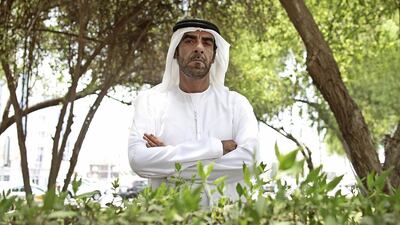ABU DHABI // Few people know more about the international narcotics trade, the misery it causes and the life-destroying scourge that is drug addiction than Mohammed Al Baloushi.
He started dabbling in narcotics when he was 14. In his twenties he graduated to dealing in alcohol, then hashish, then heroin. By the time he was 25, Mr Al Baloushi was a fully fledged smuggler, transporting thousands of tonnes of drugs into and out of the UAE.
And when, inevitably, he was caught, he missed his children growing up because he spent eight years behind bars.
“My path was not a happy path,” he says. “Those in the drug world are miserable. They are the most depressed people in the world. It’s a horrible life.
“If you are doing it for the money and you are poor, you will remain poor because you will squander all your money on your addiction and you will also be a criminal. Drugs will also ruin you physically.
“There is no happiness with drugs. It only brings sorrow. A drug addict looks and feels miserable.”
Drug addiction, Mr Al Baloushi says, is the start of a slippery slope. “When you start abusing drugs, you eventually start dealing because you need to make money to pay for your addiction.”
For him, it was a short step from dealing to trafficking. “I got greedy,” he says. “I was dealing drugs for other people to sell and just got a cut. I thought, why shouldn’t I be the smuggler and the seller? You can make Dh15,000 in a few hours and Dh100,000 for trafficking.”
The sources for the narcotics he distributed were “mostly foreigners from Asia, Pakistan, Iran”, he says. “I got to know them and learnt everything I could from them. Eventually I started travelling with them to their countries.” The sole purpose of the travels was to smuggle drugs.
Then Mr Al Baloushi started to expand his operations beyond the UAE. With tight border controls in place, such activities are impossible now, he says. “These foreign drug traders are not in the UAE any more. They would easily get caught if they were. They live in tribal areas in their country that do not fall under any law of government.”
Foreigners, he says, created the culture of dealing and trafficking in the UAE. “Before they used to smuggle in the drugs and we were the users. Now we do it all.”
Mr Al Baloushi’s downfall came in 1996 when a rival dealer, jealous of his hold on the market, informed on him. Police set up a sting operation.
“A Pakistani man called me and asked for 100kg of hashish. I told him I didn’t have that amount but I had less. I had only 50kg. He agreed and we set up a meeting.”
But the “customer” who met Mr Al Baloushi was an undercover agent working for Dubai Police. Even then, Mr Al Baloushi became suspicious. When he was asked to open the bag with the drugs, he refused.
“We don’t usually do that. There is usually a mutual trust between dealers and customers. I told him to open the bag himself, which made him panic and give the sign for my arrest.”
Because no money changed hands, Mr Al Baloushi was convicted of a lesser charge of possessing narcotics with intent to distribute, and sentenced to 25 years in Dubai Central Jail. His sentence was reduced to 15 years on appeal, and later to eight, after he won a Quran memorisation contest.
During his last three years in prison he started to tell the personal stories of his fellow inmates in a weekly column in the Arabic daily Al Khaleej. He was the first prisoner to have a regular writing job, and found a passion for it.
“I spoke eight languages because of all the time I spent with the different dealers,” says Mr Al Baloushi, who lives in Al Ain. “So I also helped the inmates write letters to their families.”
He hopes to publish his stories, if he can find funding for a book.
The turning point in his life came when he was released from prison, and managed to resist the temptation to return to his old business.
“Most drug addicts come out from prison a hero,” he says. “He is immediately surrounded by people who want drugs, and because these people know he was in jail for drugs they think he has access to drugs. The offer is hard to turn down.”
He says the biggest mistake the prison system used to make was not separating dealers and abusers. Now, they are kept apart.
“Most people learn drug trading in prison,” he says. “When you put an addict and a dealer together, it will always result in the addict turning to the drugs trade.”
Mr Al Baloushi believes young people should be told constantly about the threat that drug abuse and addiction pose to their physical and mental health.
“We remember to combat drugs only during campaigns. Why isn’t this taught in schools? We need to create a generation that says no to drugs.”
salnuwais@thenational.ae

